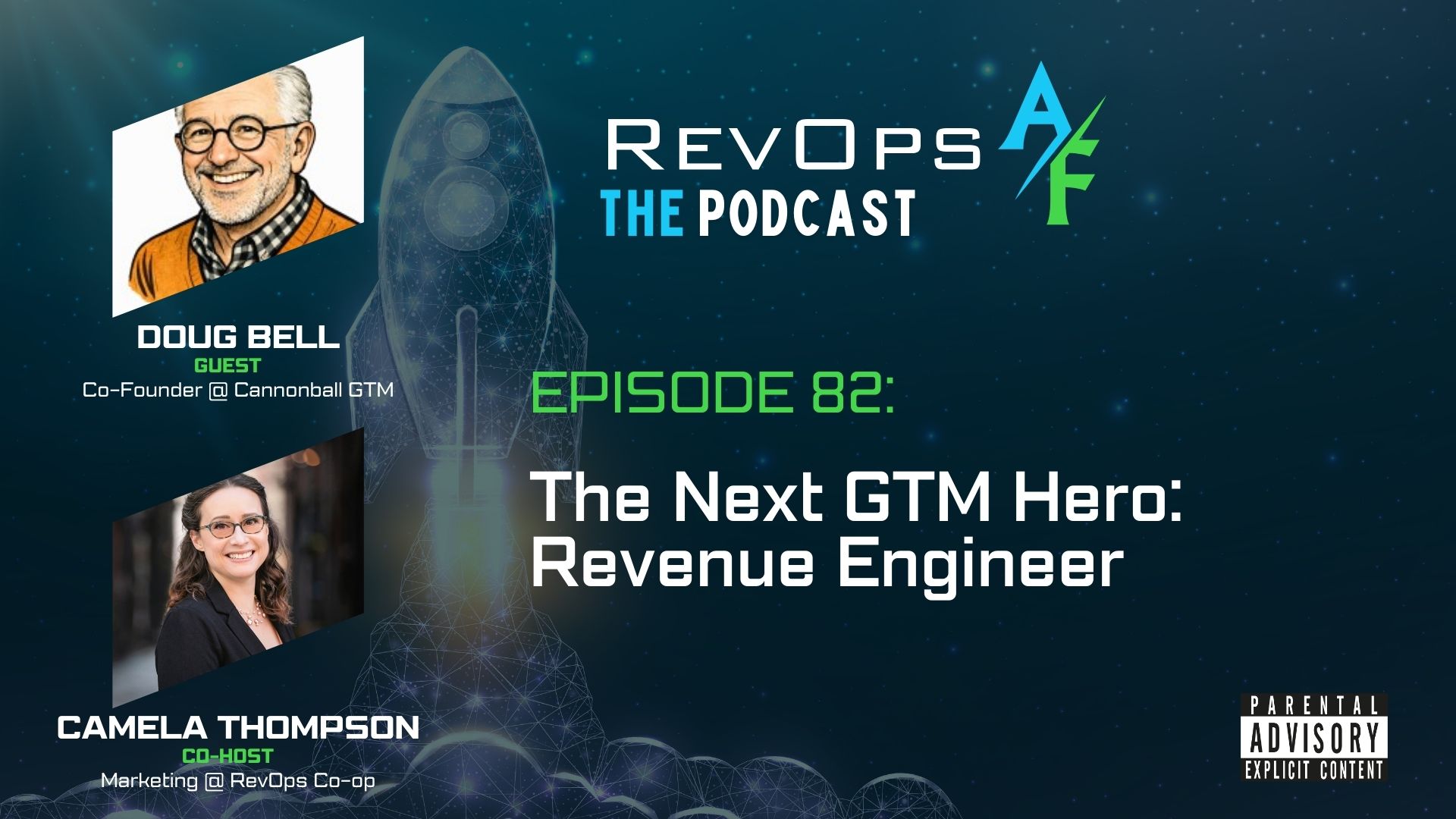
Episode 82: The Next GTM Hero: Revenue Engineer
Discover how Revenue Engineers are disrupting traditional RevOps with AI-powered go-to-market strategies, pain-based segmentation, and $200K+ salaries.
In this episode of the RevOpsAF podcast, host Matthew Volm speaks with Aaron Bird, Co-Founder and CEO of Inflection.io. Aaron is a seasoned entrepreneur with a rich background in data-driven marketing solutions. Before founding Inflection.io, he was the CEO and founder of Bizible, a leading marketing attribution platform that was acquired by Marketo and later Adobe.
With over 15 years of experience in helping companies leverage their data assets, Aaron shares his expertise on how businesses can operationalize data to enhance customer insights, improve attribution, and drive revenue growth. In this discussion, Aaron delves into the importance of data unification, best practices for storing and organizing data, the role of AI in data activation, and how RevOps teams can transition to next-generation tools to fully harness the power of their data.
Bizible grew from an earlier Seattle-based business that helped local companies grow online. As his customers grew, they started to ask Aaron to prove that it was his company’s efforts that were making a difference. Aaron and his co-founder met this expectation by building attribution hooking into QuickBooks to show customers the hard data. Soon, they brought their custom attribution engine to the broader B2B world.
Aaron Bird emphasizes the critical role of data in understanding customer behavior and improving operational insights. Drawing from his experience with Bizible, Aaron underscores that effectively leveraging data assets is foundational for RevOps analytics and strategies.
“I've really spent my whole career just helping companies use their data better.” - Aaron Bird
Jump to the clip for the low-down on the early days of Bizible.
He clarifies the distinction between first-party and third-party data. First-party data encompasses information a company collects and owns, such as CRM records and website analytics. Third-party data, on the other hand, includes purchased information like enrichment data from providers such as ZoomInfo or Clearbit. Understanding these data types is essential for RevOps professionals in structuring a comprehensive data strategy that combines owned data with external insights.
Jump to the clip for detailed definitions of first-party and third-party data.
A central theme in the conversation is the importance of unifying data across various sources. Aaron explains that unique identifiers like email addresses, IP addresses, and domain names are crucial for stitching together data from different systems.
By using these common keys, companies can create accurate and holistic views of accounts and customers. Aaron encourages listeners to consider moving all of their data to a data warehouse sooner rather than later as you’ll eventually need the business intelligence layers to really visualize summarized views of your data.
“You have to be intentional and think about what data you’re bringing together.” - Aaron Bird
Jump to the clip for Aaron’s advice on moving to a data warehouse earlier rather than later.
When it comes to storing and organizing data, Aaron advises against tackling data unification as a massive, all-encompassing project. Instead, he recommends prioritizing essential data that directly supports specific business goals and incrementally building a comprehensive view over time. This approach keeps RevOps teams agile and allows them to learn as they iterate.
Jump to the clip to learn about common pitfalls in the data warehouse journey.
He highlights the value of maintaining a shared data dictionary to define key performance indicators (KPIs) and metrics. A well-documented data dictionary ensures consistent reporting and interpretation across different functions within an organization. By reducing ambiguity, teams can align more effectively and boost overall productivity.
“I think RevOps folks will relate even just in Salesforce, right? What is revenue? How do we measure it? You know, Is it ARR? - Aaron Bird
Jump to the clip to hear how data warehouses can really complicate data definitions.
The discussion moves into how companies can activate their unified data. Aaron describes the process of streaming data into business applications, which, when combined with artificial intelligence, enhances personalized outreach and customer experiences. He notes that the true value of data is realized when it is actively used to drive business outcomes, not just stored and visualized.
Jump to the clip for 2 ways to activate your data today.
Finally, Aaron encourages RevOps teams to adopt modern data platforms and tools that support full data integration. By moving towards applications designed for the modern data stack, organizations can simplify data activation and reporting. This transition enables teams to unlock the full potential of their data assets and stay competitive in an increasingly data-driven landscape.
“There are some next-generation CRMs, I think that are embracing the big data stack.” - Aaron Bird
Jump to the clip to hear about how Inflection.io is part of a new age of RevOps tools.
Looking for more great content? Check out our blog and join the community.
Our average member has more than 5 years of RevOps experience. That means you’ll have real-time access to seasoned professionals. All we ask is that you’re generous with your knowledge in return.